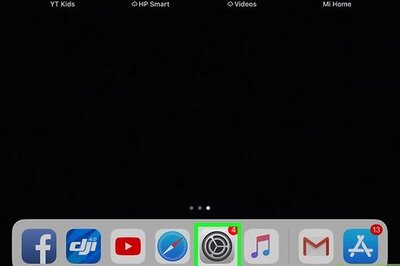
views
When we buy a healthcare policy, we think we will continue to renew the same plan. However, the relationship between the policyholder and insurer may not always stay the same. For instance, if the insurer rejects a claim request without proper clarification or the policyholder finds out that another insurance provider is offering the same plan at a lower premium, one may consider switching to the new insurer. This is where the Health Insurance Portability comes into the picture and helps you retain valuable benefits like No Claim Bonuses (NCB) and waiting period credits. Read on to learn more about it.
Buying a health insurance plan is a huge decision for the family’s future and well-being, and that’s why people take time to choose one. Yet, one can make wrong decisions. There could be many reasons why you are not happy with your current insurer and want to move on with another insurer who provides a better plan that suits your needs. This switching of your health insurance plan from one insurer to another is called porting. Porting of health insurance is a potent tool to ensure policyholders receive comprehensive coverage at an affordable price. Let’s take a closer look at the benefits of portin health plan and understand the right reasons to port.
What is Health Insurance Portability
Transferring your existing healthcare policy to another insurance company without losing the renewal benefits is called health insurance portability. While porting, the No Claim Bonus (NCB) and waiting periods also get transferred so you don’t lose your accumulated NCB or start the waiting period all over again. Porting can be done only at the time of renewal.
How to port a health insurance policy?
Porting is a simple process, and here are the steps —
Step 1: Notify the current insurer about your decision to port at least 45 days before the policy renewal date. You have to submit a portability application mentioning the name of the new insurer.
Step 2: Once the insurer receives the application, you will receive a proposal form and a portability form.
Step 3: Fill out the forms and submit them to the new insurance company, along with KYC documents and a copy of your current policy.
Step 4: The insurer will review the application and respond within 15 days of receiving your request to port.
Step 5: Once the application gets approved and the new policy is issued, check the terms and conditions of the plan.
Step 6: If you are satisfied with the policy terms, inform your old insurance provider to cancel the existing plan.
Documents Required for Porting
Here are the documents that may be required during health insurance portability:
- Portability form which must be filled with accurate information and signed by the policyholder
- Current policy document
- Age proof of members insured
- Address and identity proof
- Claim history
- Medical reports, if required by the new insurer
When should you port your health insurance policy?
- When you want a better health insurance plan: If you find a policy that offers better coverage, more benefits, or some treatments that your existing policy doesn’t provide, then it makes sense to port your health insurance plan.
- When you are not happy with the current insurance provider: If you are not satisfied with the current insurer in matters related to customer service, claim settlement, or any other service-related problems, then you should switch.
- When you get a cost-effective plan: This is a significant reason for porting. After comparing different plans, if you find a policy which offers similar or better coverage at an affordable cost, you can move to another insurance provider and save on the premium costs.
- When you want to shift to a provider with a digital presence: If your current insurer still follows the offline process, an insurer with a digital presence is a better option.
- When you relocate and the services are limited: If you shift to another city or state with limited coverage and network hospitals, you can consider porting to an insurer with better coverage.
Guidelines for porting your health insurance policy
The IRDAI has set some rules of health insurance portability that you should know, such as:
- Notify your insurance company about your decision to port. You have to give an application at least 45 days before the policy renewal date. The application must have the name of the insurance company to which you want to switch.
- You can port only to a similar type of policy; you cannot change the policy type or plan and coverage while porting. For example, if you have an individual health insurance policy, you can only port it to another individual healthcare plan.
- There should not be any break in your health insurance coverage.
- No fee is charged for porting.
- There may be a change in premium based on the new insurer’s charges.
- You can increase the sum insured, but the new insurance company has to approve it. You cannot reduce the sum insured; it has to be the same or more.
- While portability is being processed, you will get a grace period to pay the premium, but you will not receive coverage during the grace period.
- Waiting periods are not affected while porting your policy. For instance, if the waiting period for a pre-existing disease is 3 years, and you have completed 2 years, then under the new policy, the waiting period gets reduced to 1 year.
- The No Claim Bonus points earned can be ported to the new policy.
Can your health insurance portability be denied?
Although porting a health insurance policy is easy, your porting request can still be denied in certain situations, such as:
- If the information or documentation provided by you is incomplete
- If your existing policy has lapsed
- If you fail to apply for portability within 45 days before the policy renewal date
- If there’s a delay in applying for a porting request and your policy has already been renewed
- If you have not paid the premiums for a considerable period
- If your claim history is poor, it means you have made multiple claims in the past
- If you have exceeded the entry age limit allowed under the new plan to which you want to port
While applying for a portability request, ensure all the required documents are ready to avoid rejection.
Conclusion
If unsatisfied with your health insurance plan or insurer, you don’t have to stick to them lifelong. Now, you have an option to port to another insurer or health insurance plan while retaining the benefits of the existing policy. The process of porting is also easy. So, if you have found better health insurance plans, you have to inform your current insurer about porting at least 45 days before the policy renewal. Remember, porting is done only during renewal.
Disclaimer: The above information is for illustrative purposes only. For more details, please refer to the policy wordings and prospectus before concluding the sales.
This is a Partnered Post.




















Comments
0 comment